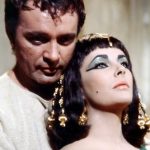 History
History  History
History  Health
Health 10 Everyday Activities That Secretly Alter Consciousness
 History
History Top 10 Historical Disasters Caused by Someone Calling in Sick
 Animals
Animals 10 New Shark Secrets That Recently Dropped
 Movies and TV
Movies and TV 10 Forgotten Realities of Early Live Television Broadcasts
 Technology
Technology 10 Stopgap Technologies That Became Industry Standards
 Weird Stuff
Weird Stuff 10 Wild Facts About Taxidermy That You Probably Didn’t Know
 Travel
Travel 10 Beautiful Travel Destinations (That Will Kill You)
 Miscellaneous
Miscellaneous 10 Modern Marriage Rituals Born from Corporate Branding
 Weird Stuff
Weird Stuff Ten Bizarre Visions of 2026 from Fiction
 History
History 10 “Modern” Problems with Surprising Historical Analogs
 Health
Health 10 Everyday Activities That Secretly Alter Consciousness
 History
History Top 10 Historical Disasters Caused by Someone Calling in Sick
Who's Behind Listverse?

Jamie Frater
Head Editor
Jamie founded Listverse due to an insatiable desire to share fascinating, obscure, and bizarre facts. He has been a guest speaker on numerous national radio and television stations and is a five time published author.
More About Us Animals
Animals 10 New Shark Secrets That Recently Dropped
 Movies and TV
Movies and TV 10 Forgotten Realities of Early Live Television Broadcasts
 Technology
Technology 10 Stopgap Technologies That Became Industry Standards
 Weird Stuff
Weird Stuff 10 Wild Facts About Taxidermy That You Probably Didn’t Know
 Travel
Travel 10 Beautiful Travel Destinations (That Will Kill You)
 Miscellaneous
Miscellaneous 10 Modern Marriage Rituals Born from Corporate Branding
 Weird Stuff
Weird Stuff Ten Bizarre Visions of 2026 from Fiction
10 Movie Adaptions That Brought Popular Songs to Life
Turning songs into movies offers a unique way to explore the narrative depth embedded in music. While many songs serve as memorable movie themes, few are adapted directly into films that bring the characters and stories within the lyrics to life. These films often delve into the vivid tales depicted in the songs, adding layers of visual storytelling to the lyrical content.
This list of ten movies is based on popular songs, showcasing how filmmakers have expanded upon these musical narratives, creating entertaining experiences and sometimes reflecting relevant social issues. While none of these are classic Hollywood masterpieces, many still enjoy a cult following.
Related: 10 True-Story Movies That Will Restore Faith in Humanity
10 Ode to Billie Joe
The film Ode to Billy Joe (1976) was directed by Max Baer Jr. and starred Robby Benson. It expands on the mysterious and tragic story told in Bobbie Gentry’s 1967 hit song of the same name. Set in rural Mississippi in the 1950s, the movie follows the lives of Billy Joe McAllister and his girlfriend, Bobbie Lee Hartley. The plot centers on the events leading up to Billy Joe’s suicide, exploring themes of love, guilt, and societal pressure. The film attempts to answer the song’s central mystery: why Billy Joe jumped off the Tallahatchie Bridge.
The song’s success and enigmatic story prompted Gentry herself to write a screenplay. The movie adaptation stayed true to the Southern Gothic tone of the song, adding depth to the characters and their backgrounds. Ode to Billy Joe grossed over $27 million, a significant achievement for a film of its genre at the time. It also sparked renewed interest in Gentry’s music, cementing the song’s place in American pop culture.[1]
9 Take This Job and Shove It
The 1981 film Take This Job and Shove It is a comedy inspired by Johnny Paycheck’s 1977 country hit of the same name. Starrring Robert Hays, Art Carney, and Barbara Hershey, the story follows Frank Macklin, a young executive sent to a small town to improve the efficiency of a brewery. However, Frank faces resistance from the local workers, who are skeptical of his motives. As he reconnects with old friends and rediscovers his roots, Frank must decide whether to prioritize corporate success or the well-being of the community.
The film’s title and premise resonated with American workers facing economic uncertainties in the early 1980s. While it didn’t achieve critical acclaim, it became a cult favorite among fans of workplace comedies. The movie featured cameos from country music stars, including Johnny Paycheck himself, adding an authentic touch to its portrayal of blue-collar life.[2]
8 The Indian Runner
The Indian Runner (1991), directed by Sean Penn, is based on Bruce Springsteen’s song “Highway Patrolman” from his 1982 album Nebraska. The film tells the story of the Roberts brothers, Joe (David Morse) and Frank (Viggo Mortensen), whose lives take divergent paths. Joe is a highway patrolman dedicated to upholding the law, while Frank is a troubled Vietnam War veteran who struggles to find his place in society. The movie explores themes of family loyalty, guilt, and redemption as Joe grapples with his duty to arrest his own brother.
Sean Penn’s directorial debut received praise for its emotional depth and strong performances. The film remains a poignant exploration of the complexities of brotherhood and moral duty. Penn’s adaptation stays true to the melancholic tone of Springsteen’s song, enhancing its narrative with a rich cinematic portrayal.[3]
7 Coward of the County
Adapted from Kenny Rogers’ 1979 hit song, Coward of the County (1981) tells the story of Tommy Spencer, a young man known for avoiding conflict. The made-for-TV movie explores his life in a rural Southern town, where he is taunted for his pacifist ways. However, when his beloved Becky is assaulted by a gang called the Gatlin Boys, Tommy is forced to confront his fears and seek justice. The movie delves into themes of courage, vengeance, and moral choices.
Kenny Rogers not only starred in the film but also served as its executive producer. The movie was a ratings success, capitalizing on Rogers’ popularity at the time. Its strong moral message and compelling storyline resonated with audiences, making it a memorable entry in the genre of music-inspired films. [4]
6 Alice’s Restaurant
Alice’s Restaurant (1969), directed by Arthur Penn, is based on Arlo Guthrie’s satirical song “Alice’s Restaurant Massacree.” The film follows a dramatized version of Guthrie’s own experiences, starting with his visit to Alice and Ray Brock’s home in Massachusetts for Thanksgiving. When Guthrie is arrested for littering, the story spirals into a broader critique of the Vietnam War draft and societal norms. The film’s blend of humor and social commentary captures the spirit of the 1960s counterculture.
The movie was released just a few years after the song’s debut and became a cult classic, embodying the anti-establishment sentiments of the era. Arlo Guthrie’s performance as himself added authenticity to the film. The movie’s success helped cement the song’s place in American folklore and highlighted the power of music as a tool for social change.[5]
5 Copacabana
The 1985 TV movie Copacabana brings Barry Manilow’s 1978 disco hit to life. The film follows the story of Lola Lamar, a young singer who dreams of making it big at the famous Copacabana nightclub in New York City. As she navigates the challenges of the entertainment industry, Lola finds herself entangled in a love triangle with Tony, a bartender, and Rico, a gangster. The movie captures the glitz and glamour of the nightclub scene set against the backdrop of 1940s New York.
Barry Manilow starred in and composed original songs for the film, expanding on the story told in his hit single. The TV movie was well-received for its nostalgic charm and musical performances. It showcased Manilow’s versatility as a performer and solidified “Copacabana” as one of his signature songs.[6]
4 Convoy
Convoy (1978), directed by Sam Peckinpah, is inspired by C.W. McCall’s 1975 song of the same name. The film follows trucker Martin “Rubber Duck” Penwald (Kris Kristofferson) as he leads a convoy of fellow truckers across the Southwest in defiance of corrupt law enforcement. The cast also included several 1970’s popular actors, such as Ali McGraw, Ernest Borgnine, and Burt Young. The movie captures the camaraderie and rebellious spirit of the trucking community, set against the backdrop of the 1970s fuel crisis and regulatory challenges.
Despite its mixed critical reception, Convoy became a box office success and a cult classic among fans of action films and trucker culture. Kristofferson’s portrayal of Rubber Duck added depth to the character, while the film’s thrilling chase scenes and memorable dialogue contributed to its enduring popularity. The movie’s success also helped boost the popularity of the CB radio fad of the late 1970s.[7]
3 The Night the Lights Went Out in Georgia
The 1981 film adaptation of The Night the Lights Went Out in Georgia is loosely based on the 1972 song by Vicki Lawrence. The story follows siblings Amanda (Kristy McNichol) and Seth (Dennis Quaid), who find themselves embroiled in a web of small-town intrigue and corruption. Amanda and Seth travel to Nashville, Tennessee, to find fame as singers. When Seth is wrongly accused of murder, Amanda sets out to uncover the truth with Conrad (Mark Hamill) and clear his name. The movie blends elements of drama, romance, and suspense, capturing the essence of the song’s Southern Gothic narrative.
Although the film takes some liberties with the song’s storyline, it successfully captures its mood and themes. McNichol’s performance as Amanda received praise, and the film’s atmospheric setting added to its appeal. The movie contributed to the song’s lasting legacy, keeping it relevant in popular culture.[8]
2 Harper Valley P.T.A.
Harper Valley P.T.A. (1978) is a comedy-drama film based on Jeannie C. Riley’s 1968 hit song of the same name. The story follows Stella Johnson, a single mother who challenges the moral hypocrisy of the Harper Valley P.T.A. after they criticize her lifestyle. Armed with wit and determination, Stella exposes the skeletons in the closets of the self-righteous committee members, turning the tables on them. The film explores themes of social judgment, small-town politics, and personal empowerment.
Barbara Eden, best known for her role in I Dream of Jeannie, brought charm and sass to the character of Stella Johnson, making the film a lighthearted and entertaining watch. The movie’s success led to a short-lived TV series adaptation in 1981, also starring Eden. Harper Valley P.T.A. remains a beloved classic for its humorous take on small-town hypocrisy and its celebration of individualism.[9]
1 The Legend of Tom Dooley
The Legend of Tom Dooley is a 1959 Western film inspired by The Kingston Trio’s 1958 hit song, which itself is based on the real-life story of Tom Dula, a Confederate soldier accused of murdering his lover. The film follows Tom Dooley as he returns from the Civil War, only to find himself wrongfully accused of murder. As he flees from the law with his fiancée, Laura Foster, the story delves into themes of love, justice, and betrayal in post-war America.
Michael Landon, who later gained fame for his roles in Bonanza and Little House on the Prairie, stars as Tom Dooley, delivering a compelling performance that adds depth to the character. The film captures the tragic romance and the turbulent historical backdrop of the song’s narrative. Although not a major box office hit, it remains an interesting piece of Americana, reflecting the enduring appeal of folk music and historical storytelling.[10]
+ BONUS: Born in East L.A.
Born in East L.A.(1987) is a comedy film written and directed by Cheech Marin, inspired by the 1984 song of the same name by Cheech and Chong. Their song was in itself a parody of Bruce Springsteen’s “Born in the U.S.A.” The movie follows Rudy Robles (Marin), a Mexican-American who is mistakenly deported to Mexico despite being born and raised in East Los Angeles. Stranded without identification, Rudy embarks on a series of comedic misadventures as he tries to return home. The film addresses themes of identity, immigration, and cultural assimilation with humor and heart.
The film marked Cheech Marin’s directorial debut and showcased his ability to blend comedy with social commentary. It received positive reviews for its humorous yet poignant take on immigration issues and the Mexican-American experience. Born in East L.A. became a cult classic, resonating with audiences for its relatable story and Marin’s charismatic performance. The film’s success also highlighted the growing visibility of Latino culture in mainstream American media.[11]








